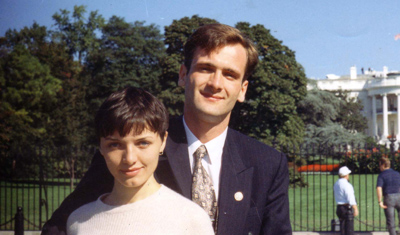More than 12 years after several police officers strangled and beheaded muckraking online reporter Georgy Gongadze in a forest outside Kiev, justice in the case is still evasive and riddled with, well, riddles.
On January 29, years after the September 2000 slaying, a Kiev court sentenced Aleksei Pukach, a former police general, to life in prison on charges of killing the journalist. Pukach’s accomplices had been convicted and sent to prison five years earlier, in March 2008.
But Gongadze’s family and the public, both at home and abroad, want two questions to be answered: Who ordered the murder? And do the authorities have the political will to hold the masterminds to account?
On Wednesday, local and international news reports said that Ukrainian prosecutors were seeking to file charges against former President Leonid Kuchma, who has long been accused of sanctioning Gongadze’s murder in retaliation for his reporting on corruption in the government. The reports cited an interview that Renat Kuzmin, Ukraine’s deputy prosecutor general, gave to the independent Russian broadcaster Ekho Moskvy.
“Ukraine’s Leonid Kuchma ‘implicated’ in Gongadze death,” one headline said. Another read: “Ukraine ex-leader accused in journalist’s killing.”
To those familiar with the case, however, the roaring headlines appear to be backed up by little news. Instead, they look like yet another public relations campaign with a purpose aside from bringing justice in the case.
Firstly, the same prosecutor, Kuzmin, announced two years ago, in March 2011, that his agency indicted Kuchma on charges of “abuse of office that led to the journalist’s murder.” The case against the former leader was then based on audiotapes secretly made, and later publicized, by Kuchma’s former bodyguard. On those recordings, a voice purportedly belonging to Kuchma, who continues to deny the accusations, instructs two other men to deal with Gongadze.
In late 2011, however, Ukraine’s Supreme Court declared the tapes inadmissible evidence, and ordered to the case to be scrapped.
Although Kuzmin’s agency declared that investigators would continue working on the case against Kuchma, they seem to have done little to bring him to court for cross-examination during Pukach’s trial. Aside from the tapes, prosecutors had another reason for bringing the former president to court–following his arrest in July 2010, Pukach publicly named Kuchma as a mastermind.
Valentina Telychenko, a lawyer for Gongadze’s widow, Myroslava, filed a request to summon Kuchma to court, but it was denied in December, local press reported. The former leader never showed up at the general’s trial, and Pukach’s verdict did not contain his name, local press said.
Telychenko is currently appealing Pukach’s verdict, which did not characterize the killing as a contracted crime. Part of the blame lies with Kuzmin’s agency, which in November 2010 changed the status of the case from a contract killing to a “killing on verbal order.” Based on that status, the court said the general was fulfilling the orders of the late Yuri Kravchenko, an interior minister who mysteriously died in 2005.
And lastly, it is not clear whether investigators are looking for evidence against Kuchma or if they already have it. According to the interview transcript, Kuzmin said both were true. “We have enough evidence confirming Kuchma’s involvement into this crime, and now we are conducting investigation and are gathering all possible evidence,” the prosecutor told Ekho Moskvy.
The vague statement by the high-ranking prosecutor offers no direct reply to the question about the mastermind–only suggestions of his agency’s presumed work in the case–but hints at a continuing lack of political will to secure justice in this high-profile case.
